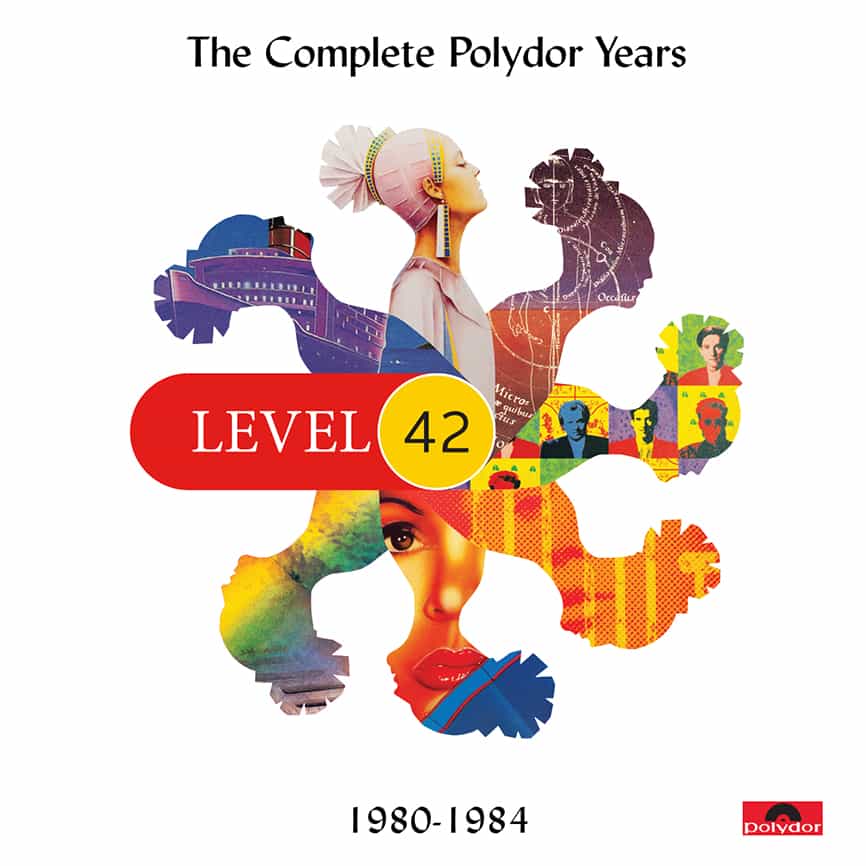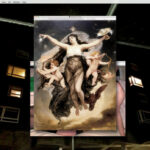Raised on the Isle of Wight in the 1970s, Mark King and the Gould brothers (Phil and Mike) played together in several bands during what were their teenage years. By 1979 Mark King and Phil Gould were based in London where Phil was studying music at London’s Guildhall School of Music and Drama. Here he would meet Mike Lindup, who found they had similar musical heroes, from Miles Davis to Jan Hammer. Phil would become involved playing drums on Robin Scott’s musical project M, whose single ‘Pop Musik’ was to reach number 2 in the UK charts in 1979. Phil’s brother Mike ‘Boon’ Gould would shortly join the band on guitar. This was just the start of a career that would take these musicians sound worldwide. Their name is a reference to “the ultimate question of life, the universe, and everything” (Douglas Adams’ book The Hitchhiker’s Guide to the Galaxy) and this comprehensive look at the band’s years 1980-84 will hopefully answer exactly where their sound started. It is Cherry Red who has brought us this collection of ten CDs, which provide nearly 9 and a half hours of music, over 102 tracks.
Originally destined to be a drummer, Mark King found himself picking up the bass guitar after landing a job selling the instrument at Charing Cross Road music shop, Macari’s. King’s style of performance has become known worldwide, with MusicRadar describing him as “the guy who put the slap in pop during the 80s”. On this collection the listener is given an in-depth view of the band’s early sounds, from instrumentals to chart-busting hits such as ‘The Sun Goes Down (Living It Up)’, and songs that have given Level 42 a career spanning four decades and 11 albums.
Starting here with their self-titled debut album, introducing this set is ‘Turn It On’ giving a demonstration of King’s bouncing bass style. Less slap on this number, it displays Lindup’s falsetto vocal presentation, which complements King’s opposite-end deep tenor perfectly. Originally the developing band was an entirely instrumental outfit, something which can be heard on this album with the following number ’43’ being one of these examples. A 7-minute track, where Lindup’s adept keyboard skills take-up where vocals might have been. On this album, ‘Heathrow’ and ‘Dune Tune’ were also instrumentals, although with three singles coming from the album this seemed perfectly weighted. Of these ‘LoveGames’ was the highest-selling from the album and featured King’s riding bass, which played alongside Lindup’s vocal. Considering the band had to decide how they would share vocal roles, it seems choosing this pairing for the band’s vocal duties was the right one.
1982 saw the release of the band’s album The Early Tapes, although recorded in 1980 this time was a further example of the band’s early outing as an instrumental outfit. This album leaned even more heavily toward the instrumental. The songs themselves also demonstrating this, with large parts lent to instrumental solos, be it saxophone, keyboard, or drums. This being a heavy part of how the group started, was the perfect building block for who the band would become, the technique being part of this learning process. As early tapes, it appears at this stage songs play second fiddle to the instrumentation and I’m hearing this before I’m noticing the song. This was part of how the band grew, rather than being any slight on them as musicians. Along with this set, the enclosed book includes comprehensive text from King, Phil Gould, and Lindup, with unofficial fifth member Wally Bandarou and promoter Paul Crockford also making contributions.
A prelude to the band’s main dish of the year, The Early Tapes would quickly step aside as the year’s feature presentation was released. The Pursuit Of Accidents would become the band’s best-selling record to date, finding its way inside the UK’s top 20, peaking at number 17. The album’s final track ‘The Chinese Way’ reached number 24 and showed what the band had learned from four years in the business by this point. Bass guitar, although high in the mix was placed just below the vocal so as not to obscure it. Lyrical content beckons the listener, pitched perfectly as its musical base sets the scene, full eastern promise. Mark would sing “Take a journey back in time, Leave the western world behind, Cross the mountains to Peking, Where the paper lanterns gently swing…”. By the time of this album’s release, it was apparent that King’s fib of some years back was meant to be, as this former sticks man was taking his role as the foundation to the band’s sound extremely seriously, his style encouraged by observing the funk of American musicians visiting Macari’s, whilst developing his take on this. This album’s title track, heard earlier on the album hears King performing high in the mix, an exceptional demonstration of just how his skills had developed, and with Lindup’s keyboard mastery, is a delightful slice of English funk. The album does delve into the songwriters’ painful experiences of love, this subject having been heard on previous outings and also in evidence here. I can’t say that this demonstrated anymore than on other albums, but just to say it is a fertile ground with which to tap for inspiration.
Heading in the right direction, 1983’s Standing In The Light would attain a number 9 UK chart placing and featured ‘The Sun Goes Down (Living It Up)’, similarly becoming the band’s most successful single to date, although it was less jazz-influenced. Lead vocals being allowed to Mike Lindup, it was heavily laced with a keyboard riff that would become as memorable as the song’s title. It was a song that used the subject of pending nuclear destruction in its lyrics, “I don’t wanna go to war, I don’t wanna go to war, I said I know what I want an’ I don’t wanna go to war. Do you follow me? I saw a soldier standing in a bar, looked so tired, he’d come so far. He said “I need to love someone before they drop the atom bomb”…”, a subject visited by bands over time, but as a Third World War seemed entirely possible as the two superpowers (the USA and USSR) faced off during the ’80s, it seemed none more relevant. But rather than doom and gloom, Level 42 had found how to add their element of humour to the subject, mixing this with a party-like vibe as was suggested in the title. Yes, we can all go to hell in a handcart, but we can at least have a good time while we’re waiting in the queue, and making this album the soundtrack might be a good start. Level 42 were not satisfied with this as a solution as is heard in ‘Dance On Heavy Weather’, as we’re told “…You can try to hide behind a mask of contemplation. Say you want to live your life in private isolation. From the east you can’t ignore the storm of disillusion. And so it falls on all our shoulders to find a new solution…” and it is with this that the listener is told to strive for a wave of new peace. Sadly nearly 40 years on, we’re still trying. Tackling politics in their lyrics and placing them in a sea of glorious pop, Level 42 were growing with an energy that would take their sound to the burgeoning world of MTV. Their video for The Sun Goes Down we learn, rather than being filmed in a sun-drenched location, was shot in a gravel pit in Suffolk, an example of something being in the eye of the beholder, but it worked.
The album True Colours followed in October of 1984 and again followed the trajectory the band had set, reaching number 14 in the UK. Headed by ‘The Chant Has Begun’ and was another song that covered the subject of warfare, although at the same time that of climate change. I remember these were subjects high on the agenda, but when I consider just how overwhelmed a band like Level 42 had been with these subjects, I find it quite alarming. These are not outright anti-war or climate-change songs, calling on the silent majority to stand up and have their voice heard. As artists like these raised the talking point, it was clear that something was going to change. The song starts, “The spirit of the people. The rhythm has begun…”, as I listen to this album I’m finding that as songwriters and musicians, the band’s ability to project is expanding at a fantastic rate. This was an album where you can hear a musical change coming from the desk, or producer at least, as it was True Colours that saw the band working with Ken Scott. It is from within the text included with this set that the band talk about this process, that as an engineer/producer Scott was a hands-on type, rather than a “sit back and check the vibe”. As a listener I’m hearing this, we have moved on quite quickly from the activist I was hearing on tracks from the last album and those lyrics from ‘Chant’, to a definite feel of ’80s exuberance, certainly in production, but also in how the music is moving. Sound is expressed in a deep bass, a synthesiser that takes the lead from Jan Hammer of the day, those of almost comic effect, and drums from Phil Gould that possess a magnitude fitting of whichever song they are playing. ‘Kouyate’ is the perfect demonstration of all of these elements. Musically larger than life, with a pace contributed to by not just the instruments heard, but also the production skills used. The final track on the album is ‘Hours By The Window’ and uses Boon’s guitar effects to fill the sound. This time a song with no pretence of stopping a war, or global climate disaster, as I hear a song of a personal loss that we all have experienced. I have to say that although this wouldn’t have any chart-bound expectations it is the kind of personal reflection you would be likely to take to your desert island.
That was the end of the band’s album releases between the years 1980-84 and although in an ordinary world this would be the end of the story, we are in the world of Cherry Red, where you will find another 5 discs worth of material from 7″ singles found on Disc Six, through B-sides on Disc Seven. Twelve Singles and Rarities on Disc Eight, to more twelve inches on Disc Nine and Bonus tracks found on Disc Ten. Of this bonus content offered across these five CDs, it has to be said that the listener has access to pretty much everything up to and including 1984. I would have to say that of those additional tracks offered on the 7″ tracks disc, ‘Out Of Sight Out Of Mind (7″ Version)’ would have to be a personal favourite. Taken from their album Staring At The Sun, the production seems to be slightly improved over that of its original album version, providing the number with at least one can of Red Bull. The B-sides disc offers a moment of Mark King providing his take on scat in ‘Beezer One’, before proceeding into a slice of lounge music. This is the third track on the disc and from two earlier instrumentals, a further two follow including ‘The Return Of The Handsome Rugged Man’ (I’d love to know who wrote this and who it was referring to), a track which shows off the band’s abilities on both bass guitar, drums and keyboard. A selection of live recordings are also available, which unfortunately omit their location of performance, which I would’ve thought for fans was essential, but I’m sure this information will be available somewhere.
Disc Eight features 12″s and Rarities including the U.S. Mix of ‘(Flying On The) Wings Of Love’ lifted from the bands …Early Tapes album from 1982, along with a mammoth 8-minute version of this number, an ’81 remix, complete with elongated drum intros and expansive passages where the production opens up the sound stage. My preference from this set of songs would have to be the 7-minute versions of ‘Love Games’ and ‘The Chinese Way’. I’ve always been a sucker for an extended mix and these are just great songs in the first place. Disc Nine contains a wealth of further 12″ mixes and if I’m perfectly honest this collection is like giving a kid a handful of candy in a sweet shop while expecting them to stop when they’ve finished this first fistful. Here the stakes are raised as a 7 minute extended mix is just the start, okay so 4’16” of ‘The Sun Goes Down (Living It Up)’ would have to be the exception, but here 8-minute mixes rub shoulders with 10-minute mixes of a Dub mix to ‘The Chinese Way’ and a ‘Mastermix’ of ‘Hot Water’. The 1980s really knew how to mix a song, in the same way, designers applied shoulder pads to suits, bigger was always better.
Finally, Disc Ten is a ‘bonus tracks’ set of 13 songs from across the band’s work to 1984 with a collection of live versions of ‘Sandstorm’ and ‘Mr. Pink’ from 1982, as well as ‘Heathrow’, and ‘Turn It On’ and a further three numbers from a performance at The Regal Theatre, Hitchin in 1983, numbers that were taken from the band’s live album The Pursuit Of Accidents. Completing this disc there is a track simply named ‘Goodbye Ray Schmidt-Volk’ and after a little research, all I could dig up on this number was that it was a funked-up goodbye to music exec. Ray Schmidt-Volk of Polydor in Germany. Some might say a rather sucky close to this set of songs, but I feel it shows that these rising stars of ’80s pop had a heart that’s now stamped on this collection from Cherry Red. This was Part One, but I have it on good authority that Part Two is to follow, so watch this space.




